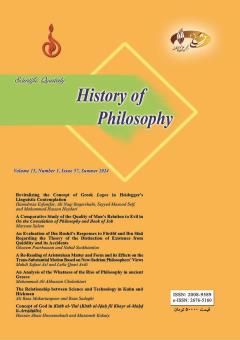The Relationship between Science and Technology in Kuhn and Hickman
Subject Areas : پیوند اندیشۀ فیلسوفان و مکاتب فلسفی با زمانه و شرایط اجتماعی و فکری
Ali Reza Mokarianpour
1
,
Reza Sadeghi
2
![]()
1 - PhD Candidate of Philosophy, University of Isfahan, Isfahan, Iran
2 - Associate Professor, Philosophy Department, University of Isfahan, Isfahan, Iran
Keywords: Philosophy of technology, technoscience, Pragmatism, Larry Hickman, John Dewey, Thomas Kuhn,
Abstract :
The concept of technoscience, as one of the central concepts in the philosophy of technology in the 20th century, has attracted great attention during the recent decades because of the existing concerns regarding the rise of artificial intelligence. In this paper, the authors compare two main views that have been presented in this regard in the 20th century. Larry Hickman, the American pragmatist philosopher, while accepting the concept of technoscience, introduces Thomas Kuhn as one of its opponents. Here, the authors investigate Kuhn’s reasons for rejecting the unity of science and technology and then criticize his view based on the fundamental principles of Hickman’s philosophy in defense of the concept of technoscience. Their main argument is that Kuhn’s view, although branded as a finding in the history of science, enjoys an ideological nature and weakens the objective bases of science. The significance of Hickman’s view lies in the fact that, relying on Dewey’s philosophy, he introduces technoscience as a teachable and, thus, manageable field.
